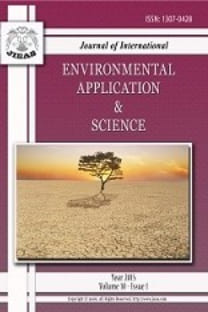Effects of Air Pollutants from Al-Dura Power plant in the Surrounding Area South Baghdad
Thermal power stations are one of the main pollution sources in Baghdad that release many toxic substances in the environment and cause toxic effects on public health. Three selected sites were selected with gradual distances from Al-Daura thermal power station within (0.5 Km (st. 1), 1 Km (st. 2) and 2 Km (st. 3), respectively) according to the direction of downwind of site. In addition, one of unpolluted site was chosen for comparison as a control site around 4 Km upwind from Al-Daura thermal power station. The samples were taken for two seasons,winter 2014 and spring 2015; the first season was in December 2014 and the second season was in March 2015. The concentrations of some pollutants that originated from Al-Daura thermal power station as air pollutants were measured. The results of air analysis showed high concentrations of Sulphur dioxide (SO2), Nitrogen dioxide (NO2), Hydrogen Sulfide (H2S) and volatile organic components (VOCs) in all three sites in comparison with control site, and the higher values for SO2, NO2 and H2S were shown in site 3; while the concentrations of VOC were higher in site 2. There are no significant differences in concentrations between the air pollutants in the two seasons, except for SO2, which were increased in the first season than in the second season.
Keywords:
Air pollution, power station,
___
- Ciaparra D, Aries E, Booth M, Anderson DR, Almeida SM, Harrad SC (2009) Characterization of volatile organic compounds and polycyclic aromatic hydrocarbons in the ambient air of steelworks. Atmospheric Environment,43, 2070–2079.
- Eghbal, M. A., Pennefather, P. S., and O’Brien, P. J. (2004). H2S cytotoxicity mechanism involves reactive oxygen species formation and mitochondrial depolarization. Journal of Toxicology, 203:69−76.
- Gauderman WJ, McConnell R, Gilliland F, London S, Thomas D, Avol E, (2000). Association between air pollution and lung function growth in Southern California children. American Journal of Respiratory and Critical Care Medicine, 162, 1-8.
- (IPCC) Intergovernmental Panel on Climate Change, (2013). "Climate Change 2013: The Physical Science Basis. Contribution of Working Group I to the Fifth Assessment Report of the Intergovernmental Panel on Climate Change". Cambridge University Press, United Kingdom and New York, NY, USA, pp. 1535.
- Kumar, S.; Katoria, D. and Sehgal, D. (2013). Environmental impact assessment of thermal power plant for sustainable development. International Journal of Environmental Engineering and Management, 4, 567-572.
- Lafta, A.; Johi, H.; Kazar, A. and Abood, S. (2014). A study on the Impact of Al-Daura power station emissions on neighboring areas.(Study report). Ministry of Environment/ Directory of Environmental Protection and Enhancement in the Middle Region/ Directory of Baghdad Environment / Branch of Monitoring Air Quality and Noise. Iraq (In Arabic). (Unpublished report).
- Njoroge, G. and UNEP (2007). Environmental Pollution and Impact of Public Health. Implication of the Dandora Municipal Dumping Site in Nairobi, Kenya.
- Singh, R.; Singh, R. K.; Gupta, N. C. and Guha, B. K. (2010). Assessment of heavy metals in fly ash and groundwater –a case study of NTPC Badarpur thermal power plant Delhi, India. Poll Res., 29, 685-689.
- Sahieb. B. H.; Ghalib. M. S.; Hasin, S. K. and Ishaq, A. (2013). The effect of residual heavy Metals originated from electric power station on internal and surrounded soils on polluted site. (Study report). Ministry of Environment/ Directory of Environmental Protection and Enhancement in the Middle Region/ Directory of Baghdad Environment / Branch of Agriculture Pesticides.Iraq (In Arabic). (unpublished report).
- Statistical Analysis System (SAS) (2012) User's Guide Statistical. Version 9.1th ed. SAS. Inc. Cary. N. C. USA. (USEPA) United States Environmental Protection Agency, (2001). How Ground-level Ozone Affects the Way We Live and Breathe. Office of Air and Radiation.
- Truong DH, Eghbal MA, Hindmarsh, W, Roth SH, O’Brien, PJ, (2006). Molecular mechanisms of hydrogen sulfide toxicity. Journal of Drug Metabolism Reviews, 38:733-744 Wang R, (2012) Physiological implications of hydrogen sulfide: a whiff exploration that blossomed. Physiol. Rev., 92, 791–896.
- ISSN: 1307-0428
- Yayın Aralığı: Yılda 4 Sayı
- Başlangıç: 2006
- Yayıncı: Selçuk Üniversitesi
Sayıdaki Diğer Makaleler
Afrim KOLİQİ, Nurten DEVA, Albana KOLİQİ
Füsun GÜLSER, Arzu ÇIĞ, Tuğba Hasibe GÖKKAYA
M. R. MOHAMMAD, M. N. MAHMOUD, A. H. AFAJ
Arianeta Deva Nura, Etleva Hamzaraj
Accumulation of Copper and Zinc in Sediments of Tigris River at Baghdad City
Muhammad N. AL-AZZAWİ, Muhanned R. NASHAAT, Dhea′a S. AHMED
O.w. MAKİNDE, T.a. ADESİYAN, İ.o. OLABANJİ, İ.a. TUNBOSUN, K.t OGUNDELE, O. ADELOWOTAN, E.a. OLUYEMİ
Füsun GÜLSER, Arzu ÇIĞ, Tuğba Hasibe GÖKKAYA
Muhammad N. AL-AZZAWİ, Muhanned R. NASHAAT, Dhea′a S. AHMED
